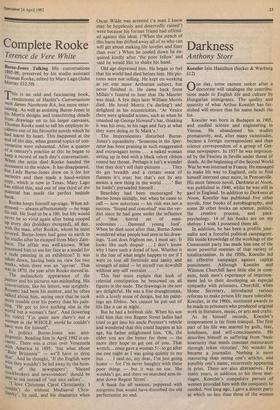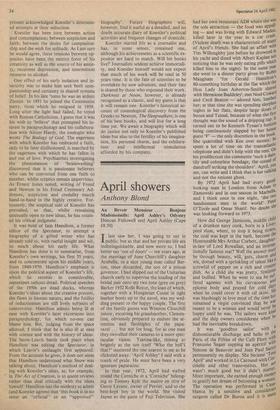Darkness
Anthony Storr
Koestler lain Hamilton (Seeker & Warburg £12)
ne day, some earnest seeker after a doctorate will catalogue the contribu- tions made to English life and culture by Hungarian immigrants. The quality and quantity of what Arthur Koestler has fur- nished will ensure that his name heads the list.
Koestler was born in Budapest in 1905, and studied science and engineering in Vienna. He abandoned his studies prematurely, and, after many vicissitudes, became a foreign correspondent and then science correspondent of a group of Ger- man newspapers. In 1937 he was imprison- ed by the Fascists in Seville under threat of death. At the beginning of the Second World War he was interned in France. He managed to make his way to England, only to find himself interned once more, in Pentonville. His most famous novel, Darkness at Noon, was published in 1940, whilst he was still in gaol in England. In addition to Darkness at Noon, Koestler has published five other novels, four books of autobiography, and some 20 other books on science, politics, the creative process, and para- psychology. 14 of his books are on my shelves: I wish I possessed them all.
In addition, he has been a prolific jour- nalist and a forceful political campaigner. His inside knowledge of the workings of the Communist party has made him one of the most powerful enemies of that variety of totalitarianism. In the 1950s, Koestler led an effective campaign against capital punishment. Although Koestler and Winston Churchill have little else in com- mon, both men's experience of imprison- ment led to their developing an especial sympathy with prisoners. Churchill, when Home Secretary, introduced various reforms to make prison life more tolerable. Koestler, in the 1960s, instituted awards to be made to prisoners who produced original work in literature, music, or arts and crafts.
As he himself records, Koestler's temperament is far from tranquil. The first part of his life was marred by guilt, fear, loneliness, and self-consciousness. He describes himself as suffering from 'basic insecurity that needs constant reassurance through token victories'. No wonder he became a journalist. Nothing is more reassuring than seeing one's articles, and possibly one's name, recurrently appearing in print. There are also alternatives. For many years, in addition to his three mar- riages, Koestler's compulsive pursuit of women provided him with the conquests he needed. Not long ago, I gave a dinner party at which no less than three of the women present acknowledged Koestler's determin- ed attempts at their seduction.
Koestler has been torn between action and contemplation; between scepticism and faith; between the desire for companion- ship and the wish for solitude. As I am sure he would agree, these tensions between op- posites have been the motive force of his creativity as well as the source of hii anxie- ty, recurrent depression, and intermittent recourse to alcohol.
One effect of his early isolation and in- security was to make him seek both com- panionship and certainty in shared systems of belief. In his late 'teens he was an ardent Zionist. In 1931 he joined the Communist party, from which he resigned in 1938. Long after the light had failed, he toyed with Roman Catholicism. I guess that it was his wish to 'believe' that prompted his in- terest in parapsychology and his collabora- tion with Alister Hardy, the zoologist who wrote The Biology of God. The eagerness with which Koestler has embraced a faith, only to be later disillusioned, is matched by the eagerness with which he has fallen in and out of love. Psychiatrists investigating the phenomenon of 'brainwashing' discovered that it is passionate believers who can be converted from one faith to another, whilst sceptics remain impervious. As Ernest Jones noted, writing of Freud and Newton in his Freud Centenary Ad- dresses, scepticism and credulity march hand-in-hand in the highly creative. For- tunately, the sceptical side of Koestler has prevailed, so that, whilst remaining unusually open to new ideas, he has retain- ed his critical judgment.
It was bold of lain Hamilton, a former editor of the Spectator, to attempt a biography of a gifted writer who has already told us, with rueful insight and wit, so much about his early life. What Hamilton has done is to summarise, from Koestler's own writings, his first 35 years, and to concentrate upon his middle years, from 1940-1970. Hamilton's emphasis is upon the political aspect of Koestler's life, which he records in considerable, sometimes tedious detail. Political speeches of the 1950s are dead ducks, whereas Koestler's ideas about the creative process, the flaws in human nature, and the futility of reductionism are still lively subjects of controversy. Hamilton admits being ill at ease with Koestler's later excursions into parapsychology, for which no-one can blame him. But, judging from the space allotted, I think that he is also ill at ease with science and with the history of ideas. The Snow-Leavis battle took place when Hamilton was editing the Spectator, in which Leavis's onslaught first appeared. From the account he gives, it does not seem that Hamilton understood what Snow was talking about. Hamilton's method of deal- ing with Koestler's ideas, as, for example, in The Act of Creation, is to quote reviews rather than deal critically with the ideas himself. Hamilton has the modesty to admit (and Koestler agrees) that 'this book is in no sense an "official" or an "approved"
biography'. Future biographers will, however, find it useful as a detailed, and no doubt accurate diary of Koestler's political activities and frequent changes of domicile.
Koestler started life as a journalist and has, in some senses, remained one, although his achievements as a scientific ex- positor are hard to match, Will his books live? Journalists seldom achieve immortali- ty, and Koestler himself would not expect that much of his work will be read in 50 years time. It is the fate of scientists to be overtaken by new advances, and their fate is shared by those who expound their work. Darkness at Noon, however, is already recognised as a classic, and my guess is that it will remain one. Koestler's historical ac- count of cosmological discovery from the Greeks to Newton, The Sleepwalkers, is one of his best books, and will live for a long time yet. We await a biography which will do justice not only to Koestler's published ideas but also to the fertility of his imagina- tion, his personal charm, and the exhilara- tion and intellectual stimulation afforded by his company.







































 Previous page
Previous page